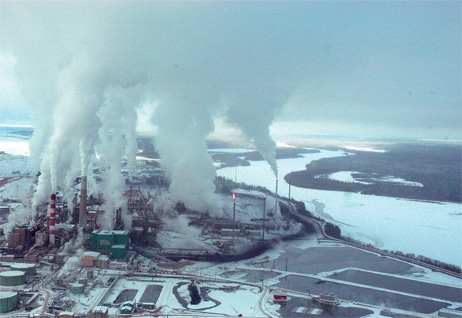The Canadian federal government deliberately excluded data documenting a 20 percent increase in annual pollution from Alberta’s tar sands industry in 2009. That detail was missing from a recent 567-page report on climate change that Canada was required to submit to the United Nations.
According to Postmedia News, Canada left the most recent numbers out of the report, a national inventory on Canada’s greenhouse gas pollution. The numbers are used to stabilize greenhouse gas emissions and prevent catastropic climate change. It is certainly not the first time that Canada has dragged its feet on its international climate obligations, but omission of vital information is a new low, even for them.
While Canada’s report reveals a six percent drop in annual emissions for the entire economy from 2008 to 2009, it fails to account for the extent of pollution from tar sands production, which is greater than the greenhouse gas emissions of all the cars driven on Canadian roads.
Canada’s attempts to greenwash Alberta’s tar sands are increasingly brazen. Last week we reported that the Canadian government was complicit with industry in the creation of an “Oil Sands Team” to lobby abroad to aggressively undermine European environmental standards.
Emissions per barrel of oil produced by tar sands developers are increasing, despite claims to the contrary made by industry in an advertising campaign.
Overall, Environment Canada said that the tar sands industry accounts for about 6.5 percent of Canada’s annual greenhouse gas emissions in 2009, up from five percent in 2008. Pollution from the tar sands has skyrocketed 300 percent since 1990, cancelling out many pollution reduction efforts in other sectors of the Canadian economy.
Industry claims that its figures do not show any significant growth in emissions per barrel of oil produced, yet the full report noted an intensity increase of 14.5 per cent from 2008 to 2009.
In the report, emissions from a mining category, which includes tar sands extraction, saw a whopping 371 per cent increase in greenhouse gas pollution.
To make matters worse, Canada was the last country to file its report to the UNFCCC. It submitted its report even after earthquake-struck Japan, and was unable to explain in detail why its report was late.
Evidence is mounting that the Harper government is deliberately trying to scuttle international action to fight climate change.
Head over to the Montreal Gazette to read more.
Subscribe to our newsletter
Stay up to date with DeSmog news and alerts






